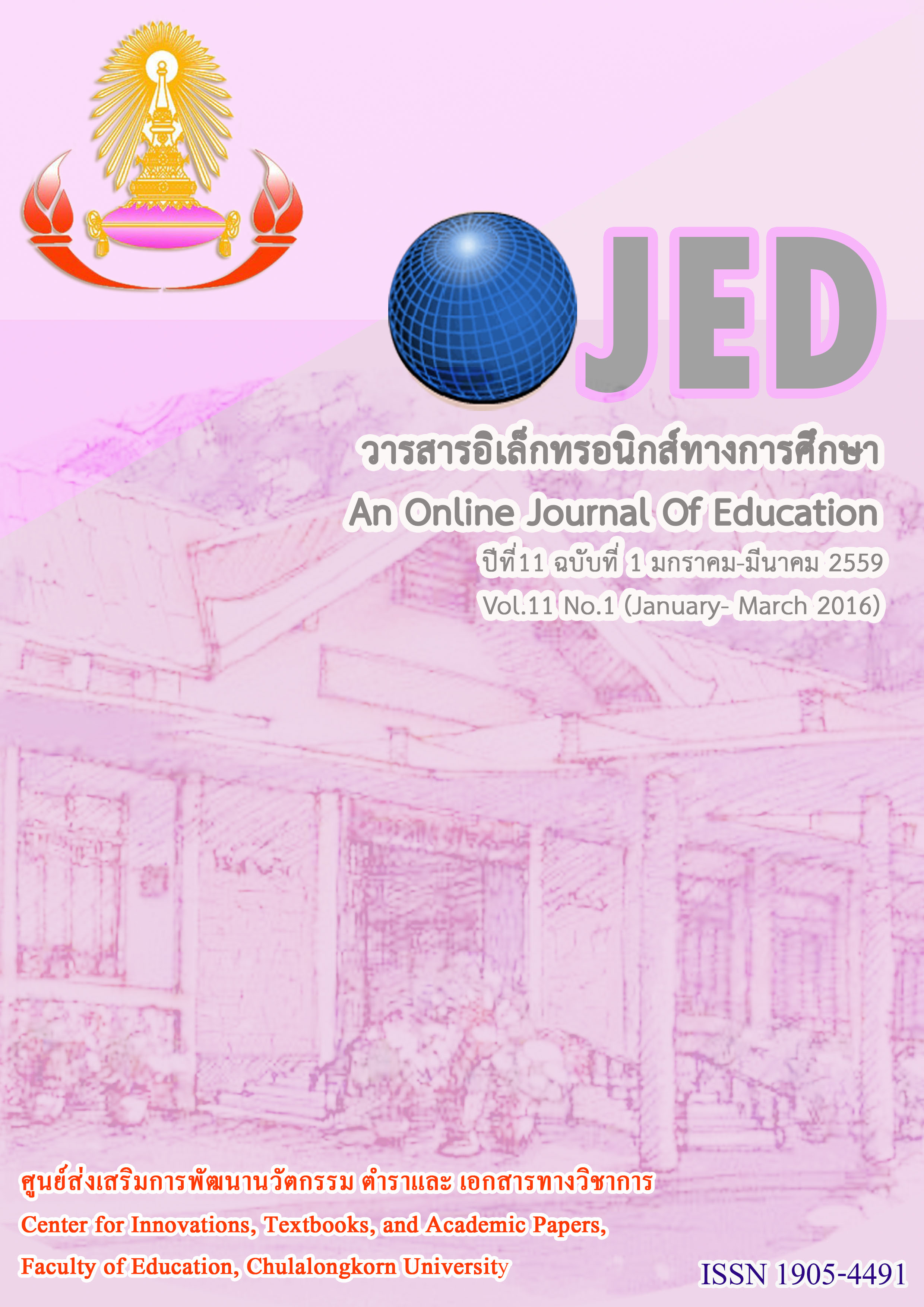ผลของการจัดประสบการณ์วิทยาศาสตร์ด้วยวัฏจักรการเรียนรู้ร่วมกับการใช้ผังมโนทัศน์ที่มีต่อ ความเข้าใจและพฤติกรรมการอนุรักษ์น้ำของเด็กอนุบาล EFFECTS OF ORGANIZING SCIENCE LEARNING EXPERIENCE USING A LEARNING CYCLE AND CONCEPT MAP ON THE UNDERSTA
Keywords:
วัฏจักรการเรียนรู้, ผังมโนทัศน์, ความเข้าใจและพฤติกรรมการอนุรักษ์น้ำ, เด็กอนุบาล, LEARNING CYCLE, CONCEPT MAP, UNDERSTANDING AND BEHAVIOR IN WATER CONSERVATION, KINDERGARTENERAbstract
การวิจัยครั้งนี้มีวัตถุประสงค์เพื่อ 1) ศึกษาความเข้าใจและพฤติกรรมการอนุรักษ์น้ำของเด็กอนุบาลที่ได้รับ
การจัดประสบการณ์วิทยาศาสตร์ด้วยวัฏจักรการเรียนรู้ร่วมกับการใช้ผังมโนทัศน์ 2) เปรียบเทียบความเข้าใจและพฤติกรรมการอนุรักษ์น้ำของเด็กอนุบาลที่ได้รับระหว่างการจัดประสบการณ์วิทยาศาสตร์ด้วยวัฏจักรการเรียนรู้ร่วมกับการใช้ผังมโนทัศน์กับการจัดประสบการณ์วิทยาศาสตร์แบบปกติ กลุ่มตัวอย่างที่ใช้ในการวิจัยคือ เด็กชั้นอนุบาลปีที่ 2
ปีการศึกษา 2558 โรงเรียนหมายเลข 4 สังกัดสำนักงานเขตพื้นที่การศึกษาประถมศึกษากรุงเทพมหานคร ที่เข้าร่วมโครงการ “Energy Mind Award” จำนวน 60 คน โดยแบ่งเป็นกลุ่มทดลอง จำนวน 30 คน และกลุ่มควบคุม จำนวน
30 คน ระยะเวลาที่ใช้ในการดำเนินงานวิจัยทั้งหมด 14 สัปดาห์ เครื่องมือที่ใช้ในการวิจัย คือ แบบวัดความเข้าใจเรื่อง
การอนุรักษ์น้ำของเด็กอนุบาลและแบบสังเกตพฤติกรรมการอนุรักษ์น้ำของเด็กอนุบาล วิเคราะห์ข้อมูลโดยหาค่าเฉลี่ย ส่วนเบี่ยงเบนมาตรฐาน และการทดสอบค่าที
ผลการวิจัย พบว่า 1) หลังทดลอง ค่าเฉลี่ยคะแนนความเข้าใจและพฤติกรรมการอนุรักษ์น้ำของเด็กอนุบาลที่ได้รับการจัดประสบการณ์วิทยาศาสตร์ด้วยวัฏจักรการเรียนรู้ร่วมกับการใช้ผังมโนทัศน์ สูงกว่าก่อนทดลองอย่างมีนัยสำคัญทางสถิติที่ระดับ .01 2) หลังทดลอง ค่าเฉลี่ยคะแนนความเข้าใจและพฤติกรรมการอนุรักษ์น้ำของเด็กอนุบาลที่ได้รับการจัดประสบการณ์วิทยาศาสตร์ด้วยวัฏจักรการเรียนรู้ร่วมกับการใช้ผังมโนทัศน์ สูงกว่าการจัดประสบการณ์วิทยาศาสตร์แบบปกติอย่างมีนัยสำคัญทางสถิติที่ระดับ .01
The purposes of the research were to 1) to study the understanding and behaviors of water conservation of kindergarteners using the organizing learning experiences through a learning cycle and concept map, and 2) to compare the understanding and behaviors in the water conservation of kindergarteners between the organization of experiences through the learning cycle and concept map and those of the traditional approach. The samples used for the research were 60 kindergarteners in the second year of kindergarten at The Number Four School under Bangkok Primary Educational Service Area Office which performed under the Energy Mind Award project in the second semester of academic year 2015. The samples were divided into two groups; 30 kindergarteners for the experimental group and 30 kindergarteners for the control group. The experiment duration was 14 weeks. The research instruments were 1) the interview form of understanding water conservation for kindergarteners, and 2) the observation form of kindergartener’s water conservation behaviors in daily routines. The data was statistically analyzed by using the arithmetic mean, standard deviation and t-test.
The research results were as follows: 1) After the experiment, the experimental group had higher mean scores in understanding and behaviors in water conservation of kindergarteners in learning than before the experiment at .01 level of significance. 2) After the experiment, the experimental group had higher mean scores of understanding and behaviors in water conservation of kindergarteners in learning than that of control group at a .01 level of significance.




